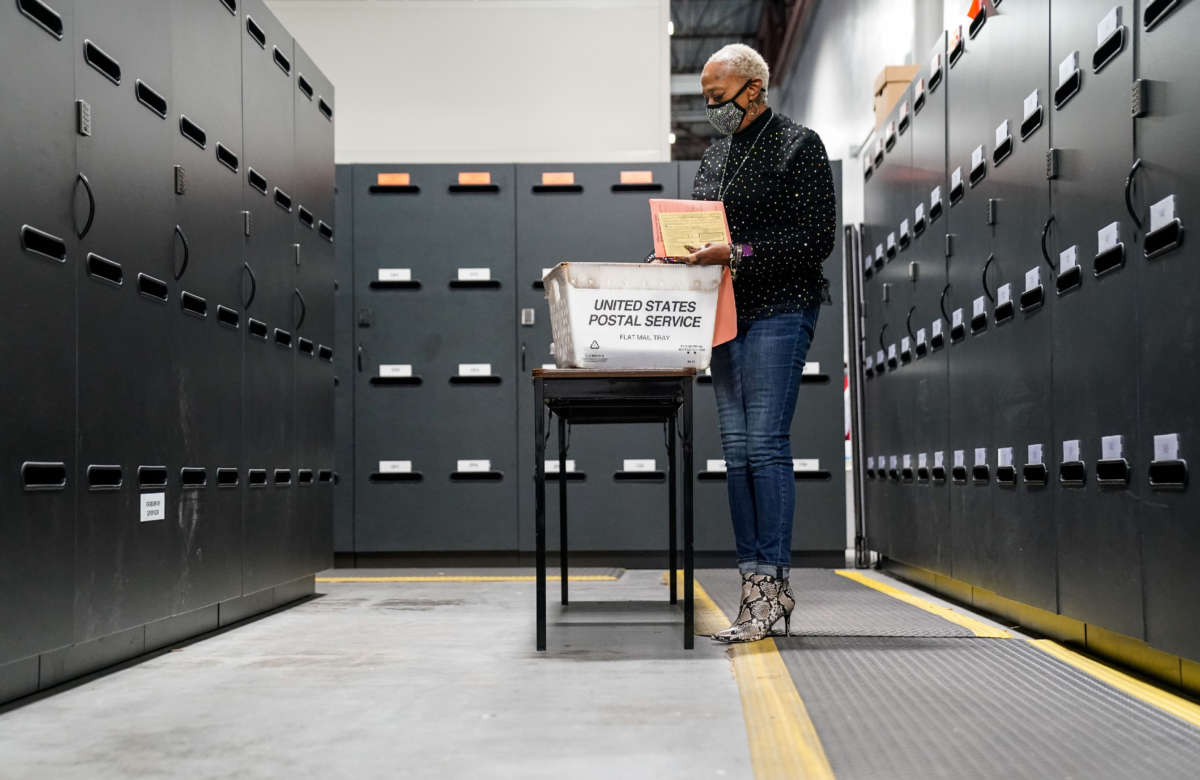Did you know that Truthout is a nonprofit and independently funded by readers like you? If you value what we do, please support our work with a donation.
Due to a voter suppression law that was passed by Republicans in Georgia last year, the rate of voters in the state who didn’t vote after having mail-in ballot applications rejected increased 45-fold, according to a new analysis by Mother Jones.
During Georgia’s municipal elections in 2021, mail-in ballot applications were rejected at a rate that was four times higher than during the 2020 election. Officials rejected a record rate of 4 percent of absentee ballot.
Mother Jones analyzed how many voters didn’t go on to cast a ballot in person due to their mail-in applications being denied, a rate that also increased dramatically last year. Of the 1,038 people who had their applications rejected in 2021, only about a quarter ultimately cast a ballot in person. That’s about 2.19 percent of total mail-in voters – a huge increase over the 0.05 percent of voters who didn’t end up voting after an application rejection in 2020.
As Mother Jones’s Ryan Little and Ari Berman wrote, the figure is “an example of how a seemingly minor change to voter access can lead to a big increase in disenfranchisement.”
The voter suppression law that Republicans rushed to pass through the legislature last spring contains a number of restrictions on absentee voting. The new law implemented stricter ID requirements for mail-in ballots, cut the period in which voters can submit their mail-in ballot requests by more than half and reduced the number of drop boxes. The law also made it illegal for election officials to mail unsolicited mail-in ballot requests.
Voter disenfranchisement has directly resulted from these changes, reporting has found. About 1 in 6 mail-in ballots were thrown out because voters had filled out their identification information incorrectly after the new ID requirements.
If the rate of rejections from last year was applied to the 2020 election, over 38,000 people would not have voted in the presidential election. This is over three times the margin of President Joe Biden’s win in Georgia; Biden won the state by only 11,000 votes.
The mail-in ballot restrictions are more likely to affect Democrats. Last year, of the people who voted in the 2020 primaries, 404 Democrats had their applications rejected, while only 145 Republicans received a rejection. Further, 351 Democrats had their mail-in ballots rejected, while only 102 Republicans experienced the same.
It’s unclear why there is a disparity between how Democrats and Republicans are affected by the new changes.
However, election experts warned last year that the Republicans’ voter suppression laws were racist. One reason for the disproportionate effects of the law, then, could be that the restrictions disproportionately affect Black voters; 58 percent of registered voters who don’t have an ID on file with the state are Black, Little and Berman pointed out. According to exit polls, Black voters in the state overwhelmingly chose Biden in the 2020 election. Black voters also participated in mail-in voting at a higher rate than other demographics in the state.
Another reason could be that Democrats generally voted by mail at a higher proportion than Republicans in the 2020 election. In some states, mail-in ballots went overwhelmingly for Biden, even in states that ultimately went for Donald Trump, like North Carolina. However, Republicans ended up having a slim margin over Democrats when it came to mail ballots in Georgia.
Republicans in other states are also cracking down on mail-in votes, leading to similar consequences. In Texas, Republicans’ voter suppression law led to a 700 percent increase of rejected mail-in ballot applications in Houston’s Harris County, which went for Biden in 2020.
A terrifying moment. We appeal for your support.
In the last weeks, we have witnessed an authoritarian assault on communities in Minnesota and across the nation.
The need for truthful, grassroots reporting is urgent at this cataclysmic historical moment. Yet, Trump-aligned billionaires and other allies have taken over many legacy media outlets — the culmination of a decades-long campaign to place control of the narrative into the hands of the political right.
We refuse to let Trump’s blatant propaganda machine go unchecked. Untethered to corporate ownership or advertisers, Truthout remains fearless in our reporting and our determination to use journalism as a tool for justice.
But we need your help just to fund our basic expenses. Over 80 percent of Truthout’s funding comes from small individual donations from our community of readers, and over a third of our total budget is supported by recurring monthly donors.
Truthout has launched a fundraiser to add 500 new monthly donors in the next 10 days. Whether you can make a small monthly donation or a larger one-time gift, Truthout only works with your support.
